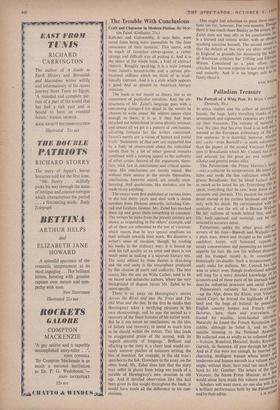The Trouble With Conclusions
Craft and Character in Modern Fiction. By Mor- ton Zabel. (Gollancz, 21s.)
KIPLING and Galsworthy, it says here, were saved from being mere journalists by 'the finer conscience of their material.' This seems, with its touch of Jamesian extravagance, a rather strange and difficult way of putting it. And it is the idiom of the whole book, a kind of abstract rhetoric. Roughly speaking, it is a style formed from James's eccentricities and a certain pro- fessional stiffness which we think of as tradi- tionally German. And it is a style which appears a good deal at present in American literary criticism.
The book is not meant as theory but as an assessment of particular novelists. And the ab- stractness of Mr. Zabel's language goes with a consuming disregard for detail in the novels he chooses to write about. He seldom comes close enough to them; it is as if they had been thrashed out beforehand in some ghostly seminar, and almost all we get is a pattern of conclusions, admiring formulm for the writers concerned. James's novels are 'a vision of human and moral truth.' Statements of that sort are supported less by a body of observation about the individual novels than by a lot of other general remarks combined with a running appeal to the authority of other critics. Several of the arguments, there- fore, stick fast in conclusions and critical quota- tions. His conclusions are mostly sound. But without their source in the novels themselves, conclusions, however sound, are usually unin- teresting. And quotations, like statistics, can be made to say anything.
The essays were first published at various times in the last thirty years and deal with a dozen novelists from Dickens onwards, including Con- rad and Graham Greene. Mr. Zabel has touched them up and given them something in common. The writers he picks from the present century are shown as responding to the others' example, and all of them are submitted to the test of vocation, which means that he lays special emphasis on their attitude towards their work. We discover a writer's sense of vocation, though', by reading his books in the ordinary way; it is bound up with his full quality as an artist and there is not much point in making it a separate literary test. The unity offered by these themes is skin-deep and the real unity is the atmosphere produced by this citation of merit and authority. The best essays, like the one on Willa Cather, tend to be on recent and debatable authors, where the very background of dispute forces Mr. Zabel to be more specific.
There is an essay on Hemingway's stories Across the River and into the Trees and The Old Man and the Sea. In the first he thinks that Hemingway takes a terrifying pleasure in his own shortcomings, and he sees the second as a recovery of the finest features of his earlier work. But he is too intent on conclusions, on the idea of failure and recovery, to spend as much time as he should within the stories. This idea leads to exaggerated praise of the second, with its 'superb sincerity of language.' Brilliant and affecting as the story is, a closer look would cer- tainly uncover patches of insincere writing, the bits of bombast, for example, in the old man's speeches to the fish. Elsewhere in the essay, on the other hand, Mr. Zabel does hint that the story may stiffer in places from being too much of a parable of Hemingway's own situation in old age. And if detailed observation like this had been given its due weight throughout the book, it would have made all the difference to his conf- dusions. One might feel reluctant to press these objec- lions too far, however. For two reasons. Though there is too much sheer finality in the essays, Zabel does not leap idly to his conclusions.. Ile is a learned and serious writer, with an obvIcn.'s teaching vocation himself. The second reason 1' that the defects of this style are often seized or! In England as grounds for dismissing the of American criticism bar Trilling and Edmun' Wilson. Considered as a joint effort, their criticism has become superior to our own in force and maturity. And it is no longer safe to be funny about it.
KARL
miLLEK






















































 Previous page
Previous page